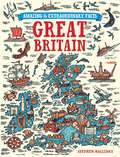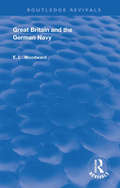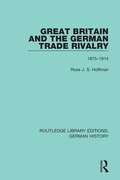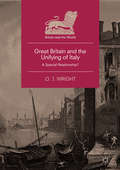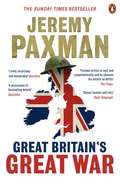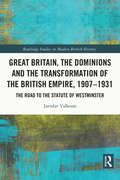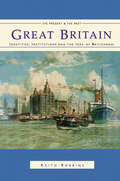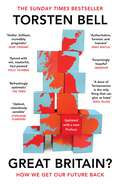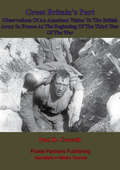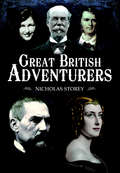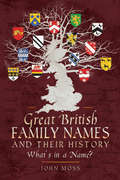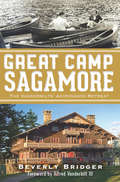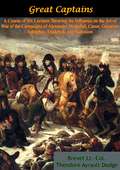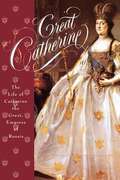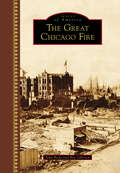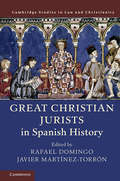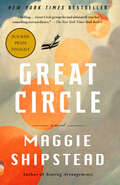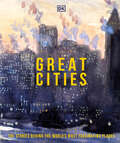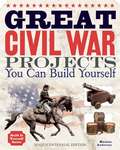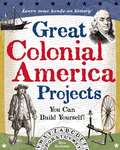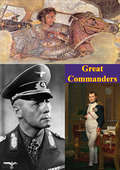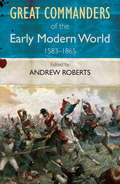- Table View
- List View
Great Britain (Amazing & Extraordinary)
by Stephen Halliday"Amazing & Extraordinary Facts about Great Britain" unearths the hidden legends, laws, landscapes, discoveries, adventures and locations that have shaped Britain's compelling, and at times, tumultuous past. Explore how Britain was formed - its geology and climate, the quirky characters and events of its history and the origin of British institutions, such as public schools, fish and chips and driving on the left hand side. Brief, accessible and entertaining pieces on a wide variety of subjects makes it the perfect book to dip in to. The amazing and extraordinary facts series presents interesting, surprising and little-known facts and stories about a wide range of topics which are guaranteed to inform, absorb and entertain in equal measure.
Great Britain and the German Navy (Routledge Revivals)
by E.L. WoodwardFirst published in 1935, in this volume E.L. Woodward reconstructs with his usual painstaking industry the various phases of Anglo-German naval relations from the enactment of the German navy laws of 1898-1900 to the months of the apparent détente just before the outbreak of war in 1914. The principle documentary collections have been carefully consulted and the material drawn from them is woven into an extended account of negotiations which for several years kept London and Berlin preoccupied with comparative shipbuilding programmes, fleet ratios and political formulas. With excellent judgement the author skilfully sets his central theme against the background of concurrent developments in the realm of European diplomacy. Though the importance of the Navy as an international power is indubitably diminished at the moment, the matter of the actual strength of the Navy is still a matter of controversy. To some extent today we can say of this book as the reviewer in The Times Literary Supplement said on its first publication in 1935: "The circumstances of today in which naval competition has again begun may differ from those of thirty years ago; but those who read and digest this balanced and accurate account of that period will not fail to observe familiarities in the two situations."
Great Britain and the German Trade Rivalry: 1875-1914 (Routledge Library Editions: German History #23)
by Ross J. HoffmanOriginally published in 1933, this volume covers 3 features of British history in the 40 years prior to the First World War: the inroad made by commercial and industrial Germany on the far-flung business empire of Great Britain; the British national reaction to this German rivalry and the influence of that rivalry upon the shaping of British policy toward Germany.
Great Britain and the Unifying of Italy: A Special Relationship? (Britain and the World)
by O. J. WrightThis book explores the interests of British leaders, diplomats and consuls in the unifying of Italy. It is the first study to provide a comprehensive narrative of British policy on Italian affairs between the formation of the Kingdom of Italy in 1861 and its consolidation as a new nation-state through the acquisitions of Venice in 1866 and Rome in 1870. Commencing with an investigation of the place of Italy within the context of mid-Victorian Britain’s global interests, the book investigates the origins of British sympathy for Italian nationalism during the 1850s, before charting the development of British foreign policy regarding Italy during its unification and consolidation. Emphasis is placed upon the tendency of British leaders and representatives to consider it their responsibility to guide the new Italy through its formative years, and upon their desire to draw Italy into a ‘special relationship’ with Britain as the dominant power within the Mediterranean.
Great Britain's Great War
by Jeremy PaxmanJeremy Paxman's magnificent history of the First World War tells the entire story of the war in one gripping narrative from the point of view of the British people.***We may think we know about it, but what was life really like for the British people during the First World War?The well-known images - the pointing finger of Lord Kitchener; a Tommy buried in the mud of the Western Front; the memorial poppies of Remembrance Day - all reinforce the idea that it was a pointless waste of life. So why did the British fight it so willingly and how did the country endure it for so long?Using a wealth of first-hand source material, Jeremy Paxman brings vividly to life the day-to-day experience of the British over the entire course of the war, from politicians, newspapermen, campaigners and Generals, to Tommies, factory workers, nurses, wives and children. It shows how both British life and identity were utterly transformed - not always for the worst - by the enormous upheaval of the war.Rich with personalities, surprises and ironies, this lively narrative history paints a picture of courage and confusion, doubts and dilemmas, and is written with Jeremy Paxman's characteristic flair for storytelling, wry humour and pithy observation.***"A fine introduction to the part Britain played in the first of the worst two wars in history. The writing is lively and the detail often surprising and memorable" Guardian"He writes so well and sympathetically, and chooses his detail so deftly, that if there is one new history of the war that you might actually enjoy from the very large centennial selection this is very likely it" The Times
Great Britain, the Dominions and the Transformation of the British Empire, 1907–1931: The Road to the Statute of Westminster (Routledge Studies in Modern British History)
by Jaroslav ValkounThe relations of Great Britain and its Dominions significantly influenced the development of the British Empire in the late 19th and the first third of the 20th century. The mutual attitude to the constitutional issues that Dominion and British leaders have continually discussed at Colonial and Imperial Conferences respectively was one of the main aspects forming the links between the mother country and the autonomous overseas territories. This volume therefore focuses on the key period when the importance of the Dominions not only increased within the Empire itself, but also in the sphere of the international relations, and the Dominions gained the opportunity to influence the forming of the Imperial foreign policy. During the first third of the 20th century, the British Empire gradually transformed into the British Commonwealth of Nations, in which the importance of Dominions excelled. The work is based on the study of unreleased sources from British archives, a large number of published documents and extensive relevant literature.
Great Britain, the Dominions and the Transformation of the British Empire, 1907–1931: The Road to the Statute of Westminster (Routledge Studies in Modern British History)
by Jaroslav ValkounThe relations of Great Britain and its Dominions significantly influenced the development of the British Empire in the late 19th and the first third of the 20th century. The mutual attitude to the constitutional issues that Dominion and British leaders have continually discussed at Colonial and Imperial Conferences respectively was one of the main aspects forming the links between the mother country and the autonomous overseas territories. This volume therefore focuses on the key period when the importance of the Dominions not only increased within the Empire itself, but also in the sphere of the international relations, and the Dominions gained the opportunity to influence the forming of the Imperial foreign policy. During the first third of the 20th century, the British Empire gradually transformed into the British Commonwealth of Nations, in which the importance of Dominions excelled. The work is based on the study of unreleased sources from British archives, a large number of published documents and extensive relevant literature.
Great Britain: Identities, Institutions and the Idea of Britishness since 1500 (The Present and The Past)
by Keith RobbinsThis is a timely exploration of national identity in Great Britain over nine hundred years of history. Our attitudes to the nation state are changing - national assemblies in Scotland and Wales and growing pressures for regional assemblies. In his vigorous new survey, Professor Robbins provides the background to these changing attitudes. He considers the development as well as the possible disintegration of the sense of "Britishness" among the inhabitants of Britain and investigates how - and why - they have preserved their own national and regional identities across several centuries of co-existence.Keith Robbins is Vice Chancellor of the University of Wales Lampeter. Among his many books, Longman has also published his highly successful study The Eclipse of a Great Power: Modern Britain 1870-1992 (Second Edition 1994). He is also General Editor of Longman's famous series ofProfiles in Power, with over 20 titles already in print and many more in preparation.
Great Britain: Identities, Institutions and the Idea of Britishness since 1500 (The Present and The Past)
by Keith RobbinsThis is a timely exploration of national identity in Great Britain over nine hundred years of history. Our attitudes to the nation state are changing - national assemblies in Scotland and Wales and growing pressures for regional assemblies. In his vigorous new survey, Professor Robbins provides the background to these changing attitudes. He considers the development as well as the possible disintegration of the sense of "Britishness" among the inhabitants of Britain and investigates how - and why - they have preserved their own national and regional identities across several centuries of co-existence.Keith Robbins is Vice Chancellor of the University of Wales Lampeter. Among his many books, Longman has also published his highly successful study The Eclipse of a Great Power: Modern Britain 1870-1992 (Second Edition 1994). He is also General Editor of Longman's famous series ofProfiles in Power, with over 20 titles already in print and many more in preparation.
Great Britain?: The must-read Sunday Times bestseller on How We Get Our Future Back
by Torsten BellTHE SUNDAY TIMES BESTSELLERAn essential blueprint for a better future, from the leading economist and Labour rising star‘Stellar: brilliant, incredibly pragmatic’ Rory Stewart‘Refreshingly optimistic’ The Times‘No one has done more to re-inject sanity into our national policy’ Emily MaitlisThere are few who are better placed to investigate Britain’s plight than Torsten Bell, Labour MP for Swansea West and former Chief Executive of the Resolution Foundation.In Great Britain? he offers both a clear-eyed diagnosis of the problems facing our country – a uniquely toxic combination of huge inequality and stagnant economic growth – and a bold vision for the alternative.In this treasure trove of enlightening and original analysis, Torsten Bell argues that our era of chaos and cynicism needs neither utopianism nor nostalgia, but a practical patriotism to raise living standards and create a more equal country. This is a book bursting with ideas and infectious hope: Bell passionately points us towards a Britain that we can actually build – a future worth fighting for.‘A roadmap to the new normal’ Observer'Pretty cool' Alastair Campbell‘A dose of Torstenomics is the only thing that can give us hope’ Amol Rajan‘Spiced with wit, masterful, fact-packed’ Polly Toynbee*Updated with a new Preface*
Great Britain’s Part —: Observations Of An American Visitor To The British Army In France At The Beginning Of The Third Year Of The War
by Paul D. CravathPaul Cravath was a prominent New York lawyer and partner of the law firm known as Cravath, Swaine and Moore: a leader of the Anglophile "Atlantacist" movement that preached closer ties with Britain in opposition to the isolationist policies of several American administrations. As part of his cause, he visited Britain during the First World War and wrote of his experiences and opinions on the war effort.An interesting political book, passionately argued.Author -- Cravath, Paul D. 1861-1940.Text taken, whole and complete, from the edition published in New York [etc.] D. Appleton and company, 1917.Original Page Count - vi and 127 pages
Great British Adventurers
by Nicholas StoreyIn selecting my adventurers, I have had to find limits. The first has been to confine my selection to men and women who are (at least loosely) British and, even then, service and adoption have sometimes, as with Krystyna Skarbeka, taken the place of birth, and I have chosen to ignore such things as competing national claims for Tenzing Norgay. The second limit that I have set myself is generally to exclude heroic adventurers in battle, simply because there is (rightly), so much already written about them, but I have found place for certain (representative) secret agents of the Second World War, whose acts (in voluntary service, beyond the call of simple duty), surely took them out of the arena of straightforward battle and into the realm of the most individual and courageous adventure. The result of these decisions remains to be judged but the overall objective has been to renew interest in the lives of some of our real heroes and heroines, as representative of the many others that there are; in an age in which contemporary sporting and pop art heroes dominate the news and provide the only readily evident inspiration, and also an age in which addiction to the computer screen nearly robs the young of memories and dreams of high adventure; of which ripping yarns are born. The third limit is a limit of time: this speaks for itself; otherwise howwould Drake and Raleigh, Clive of India, General Woolf and Captain Cook not have found their places? There have to be such limits. The final limit has been to exclude those who are widely famed already: what more is there to say of General Gordon or Dr David Livingstone of Captain Robert Falcon Scott and Captain Laurence Oates; even though what has been said should often be repeated? Moreover, although Sir Edmund Hillary is acknowledged as the first conqueror of Mount Everest; Tenzing Norgay was there with him and what of George Mallory who, some time before had died, either going up or coming down?To those who might accuse me of having been obscure, I just plead that my purpose has been to bring back into ready remembrance certain men and women, not widely fted now, who had great impact upon the accrual of knowledge of: other peoples, their customs and their countries; or who have striven, often against various obstacles (including the odds), to promote exploration and, sometimes, even to preserve life and liberty for others. To the erudite, who might say that I shed little new light and that the coverage is uneven, I plead, in mitigation of sentence, that my principal purpose has been to remind of worthy lives that might still stir our blood; and to bring them together, as representative of our adventurous people, in one handy volume.James Brooke, Rajah of Sarawak 1803–1868Mary Seacole 1805–1881 Richard and John Lander 1804–1834; 1806–1839Jane Digby 1807–1881General Sir James Abbott 1807–1896Colonel John Peard 1811–1880John William Colenso, 1st Anglican Bishop of Natal 1814–1883Sir Richard Burton 1821–1890 and John Hanning Speke 1827–1854 Emily Hobhouse 1860–1926Mary Kingsley 1862–1900Sir Francis Younghusband 1863–1942Colonel Percy Fawcett 1867–1925 and, in his wake, Peter Fleming OBE 1907–1971Cecil Henry Meares 1877–1937George Mallory 1886–1924 and Andrew Irvine 1902–1924Dame Freya Stark 1893–1993Sir Francis Chichester 1901–1972Gladys May Aylward 1902–1970Amy Johnson 1902–1941Krystyna Skarbek-Granville GM, OBE, Croix de Guerre Avec Palmes, born ca. 1908–1952Sir Fitzroy Hew Royle Maclean 1911–1996Tenzing Norgay GM 1914–1986 Violette Szabo GC, MBE 1921–1945The Present and the Future[Colonel John Blashford-Snell b. 1936Sir Ranulf Fiennes b. 1944Alan Hinkes b. 1954Adrian Hayes (45)Kenton Cool b. 1973Dame Ellen MacArthur b. 1976Rebecca Stephens b. 1982Xanadu and William Dalrymple]
Great British Family Names and Their History: What's in a Name?
by John MossA reference guide to hundreds of surnames that reveal the story of the United Kingdom across generations and centuries. To some extent, we are all products of our family history, the many generations before us. So it is with nations. The history of Great Britain has been largely defined by powerful and influential families, many of whose names came down from Celtic, Danish, Saxon or Norman ancestors. Their family names fill the pages of history books, indelibly written into events we learn about at school. Family names like Wellington, Nelson, Shakespeare, Cromwell, Constable, De Montfort, and Montgomery reflect the long, checkered history of Britain, and demonstrate the assimilation of the many cultures and languages that have migrated to the British isles over the centuries. This book is a snapshot of several hundred such family names and delves into their beginnings and derivations, making extensive use of old sources, including translations of The Domesday Book and The Anglo-Saxon Chronicles, as well as tracing many through the centuries to the present day.
Great Camp Sagamore: The Vanderbilts' Adirondack Retreat
by Alfred Vanderbilt III Beverly BridgerGreat Camp Sagamore was built by William West Durant and bought by Alfred Vanderbilt in 1901 to be his family's Adirondack retreat. Vanderbilt and his wife, Margaret, welcomed family and friends, who enjoyed its sprawling grounds and buildings for decades. After Margaret's death, though, the camp changed hands and began to decline until it was rescued by preservationists and then became a National Historic Landmark in 2000. Today, visitors to the camp participate in maintaining its grandeur, learning about and preserving the past. Read the remarkable story of one of the most unique places in the Adirondacks, written by Sagamore's director, Beverly Bridger.
Great Captain
by Honoré MorrowThe Lincoln trilogy of: Forever Free, With Malice Toward None, and The Last Full Measure.
Great Captains: of the Campaigns of Alexander, Hannibal, Cæsar, Gustavus Adolphus, Frederick, and Napoleon
by Brevet Lt.-Col. Theodore Ayrault DodgeThis book comprises six lectures delivered under the auspices of the Lowell Institute by Brevet Lieutenant-Colonel Theodore Ayrault Dodge in Boston in January, 1889.Each lecture focuses on a historically significant leader--namely Alexander, Hannibal, Cæsar, Gustavus Adolphus, Frederick, and Napoleon--and "aims to indicate briefly what we owe to the great captains, and to draw an intelligible outline of their careers."Dodge has utilized an abundance of sources of information, from Arrian's Anabasis of Alexander to Jomini's Life of Napoleon, and the book is illustrated with 21 maps.
Great Catherine
by Carolly EricksonFrom the moment the fourteen-year-old Princess Sophia of Anhalt-Zerbst agreed to marry the heir to the Russian throne, she was mired in a quicksand of intrigue. Precociously intelligent, self-confident, and attractive but with a stubborn, wayward streak, Sophia withstood a degree of emotional battering that would have broken a weaker spirit until at last she emerged, triumphant over her many enemies, as Empress Catherine II of Russia. Her achievements as empress were prodigious. She brought vast new lands under Russian rule. She raised the prestige of Russia in Europe. She began the process of imposing legal and political order on the chaos she inherited from her predecessors. Yet few historical figures have been so enthusiastically vilified as Catherine the Great. Whispers that she had ordered her husband's murder grew to murmurs that she was an immoral woman and finally to shouts that she was a depraved, lust-crazed nymphomaniac. With deft mastery of historical narrative and an unsurpassed ability to make the past live again, Carolly Erickson uncovers the real woman behind the tarnished image--an indomitable, feisty, often visionary ruler who, in an age of caveats and constraints, blithely went her own way. Great Catherine reveals the complexities of this great ruler's nature, her craving for love, her insecurities, the inevitable sorrows and disappointments of a strong empress who dared not share her power with any man yet longed to be led and guided by a loving consort. Great Catherine is a fresh portrait of an infamous historical figure, one that reveals how Catherine's flawed triumph guaranteed her posthumous fame and enhanced the might and renown of Russia for generations to come.
Great Chicago Fire, The
by John Boda Ray JohnsonAfter a hot and very dry summer, Chicago was largely a wooden tinderbox awaiting a spark that would come on the Sunday night of October 8, 1871. What became known as �the Great Chicago Fire� was a massive firestorm that moved faster than most men could run, fueled by southwest winds of at least 30 miles per hour. The heat was so intense it melted stone and brick buildings in minutes and turned sand on the lakeshore into glass. A total of 18,000 buildings were destroyed. About 100,000 were left homeless, and over 300 lost their lives. The very same day, and nearly the same hour, both the Lower Peninsula of Michigan and Peshtigo, Wisconsin, suffered similar firestorms. Peshtigo�s was even worse, creating an event that came to be known as �the Peshtigo Paradigm.� Many people believe the three fires forming a huge triangle of destruction were related as one with cosmic causes, and it remains a mystery to this day.
Great Christian Jurists in Spanish History (Cambridge Studies in Law And Christianity)
by Rafael Domingo Martínez-Torrón JavierThe Great Christian Jurists series comprises a library of national volumes of detailed biographies of leading jurists, judges and practitioners, assessing the impact of their Christian faith on the professional output of the individuals studied. Spanish legal culture, developed during the Spanish Golden Age, has had a significant influence on the legal norms and institutions that emerged in Europe and in Latin America. <P><P>This volume examines the lives of twenty key personalities in Spanish legal history, in particular how their Christian faith was a factor in molding the evolution of law. Each chapter discusses a jurist within his or her intellectual and political context. All chapters have been written by distinguished legal scholars from Spain and around the world. This diversity of international and methodological perspectives gives the volume its unique character; it will appeal to scholars, lawyers, and students interested in the interplay between religion and law.<P> Includes historical legal biographies of twenty Spanish jurists from a Christian perspective.<P> Written by world class legal historians, half of whom are from Spain.<P> Analyzes what Spanish law has brought to Western culture, including in former colonies.
Great Circle: A novel
by Maggie ShipsteadAn unforgettable story of a daredevil female aviator determined to chart her own course in life, at any cost—Great Circle spans Prohibition-era Montana, the Pacific Northwest, Alaska, New Zealand, wartime London, and modern-day Los Angeles. <P><P>After being rescued as infants from a sinking ocean liner in 1914, Marian and Jamie Graves are raised by their dissolute uncle in Missoula, Montana. There--after encountering a pair of barnstorming pilots passing through town in beat-up biplanes--Marian commences her lifelong love affair with flight. <P><P>At fourteen she drops out of school and finds an unexpected and dangerous patron in a wealthy bootlegger who provides a plane and subsidizes her lessons, an arrangement that will haunt her for the rest of her life, even as it allows her to fulfill her destiny: circumnavigating the globe by flying over the North and South Poles. <P><P>A century later, Hadley Baxter is cast to play Marian in a film that centers on Marian's disappearance in Antarctica. Vibrant, canny, disgusted with the claustrophobia of Hollywood, Hadley is eager to redefine herself after a romantic film franchise has imprisoned her in the grip of cult celebrity. <P><P>Her immersion into the character of Marian unfolds, thrillingly, alongside Marian's own story, as the two women's fates--and their hunger for self-determination in vastly different geographies and times--collide. Epic and emotional, meticulously researched and gloriously told, Great Circle is a monumental work of art, and a tremendous leap forward for the prodigiously gifted Maggie Shipstead. <P><P><b>A New York Times Bestseller</b>
Great Cities: Their History and Culture (DK History Changers)
by DKExplore the social and cultural history of 100 of the world&’s most important cities. This illustrated history book provides a fascinating insight into the events, movements, and people throughout history who have shaped the cities where we live. Written in a &“biography&” format, it offers a rich historical overview of each featured city, brought to vivid life with beautiful imagery. Inside the pages of this visual guide, discover: • The story behind each city — how it was established, critical moments in its development and why it is considered historically significant. • The different types of cities, from the centers of ancient and lost civilizations and great river cities to planned cities and modern metropolises. • Beautiful illustrations with large-scale reproductions of paintings, photographs, maps and other artifacts. • Stunning images of city life and key moments in history are complemented by close-ups of revealing details and feature panels that provide additional context. From the ancient to the modern, get under the skin of what made cities like Persepolis, Paris, Vienna, Prague, Amsterdam, Tokyo and Dubai tick. This lavish book is about more than history — it explores the art, architecture, commerce and politics of the great civilizations throughout history. Great Cities provides a unique window into how cities have become markers of human progress. Explore which ancient civilization founded the precursor to Mexico City, why Venice was the gateway to the East, what the Belle Epoque was and which city was the first to build sewers. It&’s the perfect gift for armchair explorers interested in history, geography and the arts.
Great Civil War Projects
by Maxine AndersonFrom periscopes to homemade paper, uniforms to telegraphs, Great Civil War Projects You Can Build Yourself explores the Civil War era through hands-on building projects and activities using common household and craft store items. Detailed step-by-step instructions, diagrams, and templates for creating 25 Civil War projects, combined with historical background, facts and anecdotes, and biographies and trivia, give kids a hands-on way to experience the fascinating history of one of the most important eras in American history.
Great Colonial America Projects
by Kris BordessaGreat Colonial America Projects You Can Build Yourself introduces readers ages 9-12 to colonial America through hands-on building projects. From dyeing and spinning yarn to weaving cloth, from creating tin plates and lanterns to learning wattle and daub construction. Great Colonial America Projects You Can Build Yourself gives readers a chance to experience how colonial Americans lived, cooked, entertained themselves, and interacted with their neighbors.
Great Commanders [Illustrated Edition]
by Dr Christopher GabelIncludes 3 maps and 7 illustrationsThe command of military forces in combat is unlike any other field of human endeavor. If war is the ultimate form of human competition, then the commander is the ultimate competitor. The commander operates in an environment of chance, uncertainty, and chaos, in which the stakes are, quite literally, life and death. He or she contends against an adversary who is using every means, fair or foul, to foil his plans and bring about his defeat. The commander is ultimately responsible for every variable that factors into military success or failure-training, logistics, morale, equipment, planning, and execution. The commander reaps the lion's share of plaudits in victory, but also must accept the blame in defeat, warranted or not. Very often the line that separates fame and ignominy is slender indeed.It is not difficult to identify "great" commanders, though the overwhelming majority of generals who win battles are never considered "great." Something more than a favorable ratio of wins to losses is needed to establish greatness...The truly great commander is generally considered to be one who attains the unexpected or the unprecedented; one who stands above his contemporaries through his skill on the battlefield, or through the sheer magnitude of his accomplishments....The commanders selected were masters of warfare in their particular time and environment. Each capitalized upon the social, political, economic, and technological conditions of his day to forge successful military forces and win significant and noteworthy victories that profoundly altered the world in which he lived.-Dr Christopher R. Gabel.The Great Commanders covered by this volume are Alexander the Great, Genghis Khan, Napoleon, John J. Pershing, Erwin Rommel and Curtis E. LeMay
Great Commanders of the Early Modern World: 1567-1865
by Andrew RobertsWhat qualities made the Duke of Wellington a strategic genius? How did Oliver Cromwell, a gentleman farmer, create an army that overthrew a king and changed the course of British history? Why was Simón Bolívar able to overcome early defeats to become the greatest figure in the Latin American struggle against Spanish colonialism. In Great Commanders of the Early Modern World, Andrew Roberts has assembled some of our most distinguished historians (including such names as Antonia Fraser, Saul David and Philip Dwyer) to provide an authoritative account of the lives and careers of the 26 greatest military commanders of the period, from the Duke of Marlborough to Napoleon Bonaparte, Robert Clive to Carl von Clausewitz, and Frederick the Great to Shaka Zulu. As accessible and informative as it is rigorous and scholarly, Great Commanders of the Early Modern World is the perfect introduction to its subject for the general reader, but also a stimulating and thought-provoking read for those with greater knowledge of military history. Along with the other volumes in the Great Commanders series, it is an indispensable guide to the greatest generals the world has seen.
